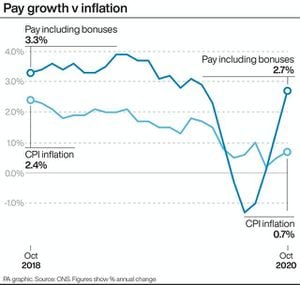Redundancies hit a record high
More people were made redundant in the UK between August and October than at any point on record as the coronavirus pandemic continued to hammer the labour market, official figures show.

The Office for National Statistics said redundancies reached a record high of 370,000 in the quarter, despite a slight fall in redundancy numbers in October.
Unemployment in the UK in the three months to October was 1.7 million – 4.9 per cent of the working population.
The extension of the furlough scheme by Chancellor Rishi Sunak prevented those numbers rising higher, but there were still 2.7m claiming unemployment benefits.
In the West Midlands unemployment in the three months to October was 161,000 – a rate of 5.5 per cent of the working population.
It was up 19.4 per cent from the previous quarter's 145,000 and 22.2 per cent on the year.
The number in employment in the region was 2.83 million.
Across the region there were 265,925 claiming unemployment benefits including Jobseeker's Allowance and Universal Credit last month.
This was up 255 on October and the claimant rate was 7.3 per cent.
Shropshire saw a rise of only 15 to 5,580 (4.5 per cent) with Telford and Wrekin down by 70 to 6,855 (6.1 per cent).
In Powys claimant numbers fell by 39 to 3,405 (4.5 per cent).

Minister for Employment Mims Davies said: “It’s been a truly challenging year for many families but with a vaccine beginning to roll out with more perhaps to follow and the number of job vacancies increasing there is hope on the horizon for 2021.
“Our Plan for Jobs is already helping people of all ages into work right across the UK, with increased Jobcentre support, new retraining schemes, new job placements like Kickstart for our young people and more to come as we are determined to build back better.”
Matthew Percival, CBI director of people and skills, said: “Another bleak set of figures this month, with a steep rise in unemployment and more redundancies showing households were still being hit hard, even ahead of England’s second national lockdown.
“While news of a vaccine has provided hope, many firms are still finding it difficult to operate within the toughest Covid restrictions.
“With millions more expected to be living under the toughest tier before the end of the week, the Government must continue to do what it can to help businesses get through winter.”
The number of UK workers on payrolls dropped slightly last month, and has fallen by 819,000 between February and November due to the impact of Covid-19.
ONS director of economic statistics Darren Morgan said: "Overall we have seen a continuation of recent trends, with a further weakening in the labour market.
"The latest monthly tax numbers show over 800,000 fewer employees on the payroll in November than in February, with new analysis finding that over a third of this fall came from the hospitality sector.
"In the three months to October, employment was still falling sharply and unemployment was rising, but the number of people neither working nor looking for work was little changed.
"Average hours per worker were continuing to recover, though this was before the second lockdown in England.
"While there was another record rise in redundancies in the latest three months as a whole, they began to ease during October."
British Chambers of Commerce head of economics Suren Thiru said: “The latest data confirms that coronavirus continues to weigh heavily on the UK labour market. The re-introduction of tighter restrictions and the expected cliff edge caused by the original furlough scheme end date in October helped drive record redundancies.
“While the furlough scheme will help safeguard many jobs over the winter months, with businesses facing the prospect of further restrictions and a messy end to the Brexit transition period, major job losses remain probable in the near term.
“Failure to achieve a UK-EU trade deal risks adding to the longer-term structural unemployment caused by the pandemic by limiting the competitiveness and viability of some industries.
“To help protect jobs and livelihoods, increased grant funding to ease the current squeeze on business cashflow and closing the gaps in government support remains vital. Delivering a UK-EU trade deal that provides clarity and certainty to businesses is crucial to avoid further damaging the UK jobs market already weakened by the pandemic.”





